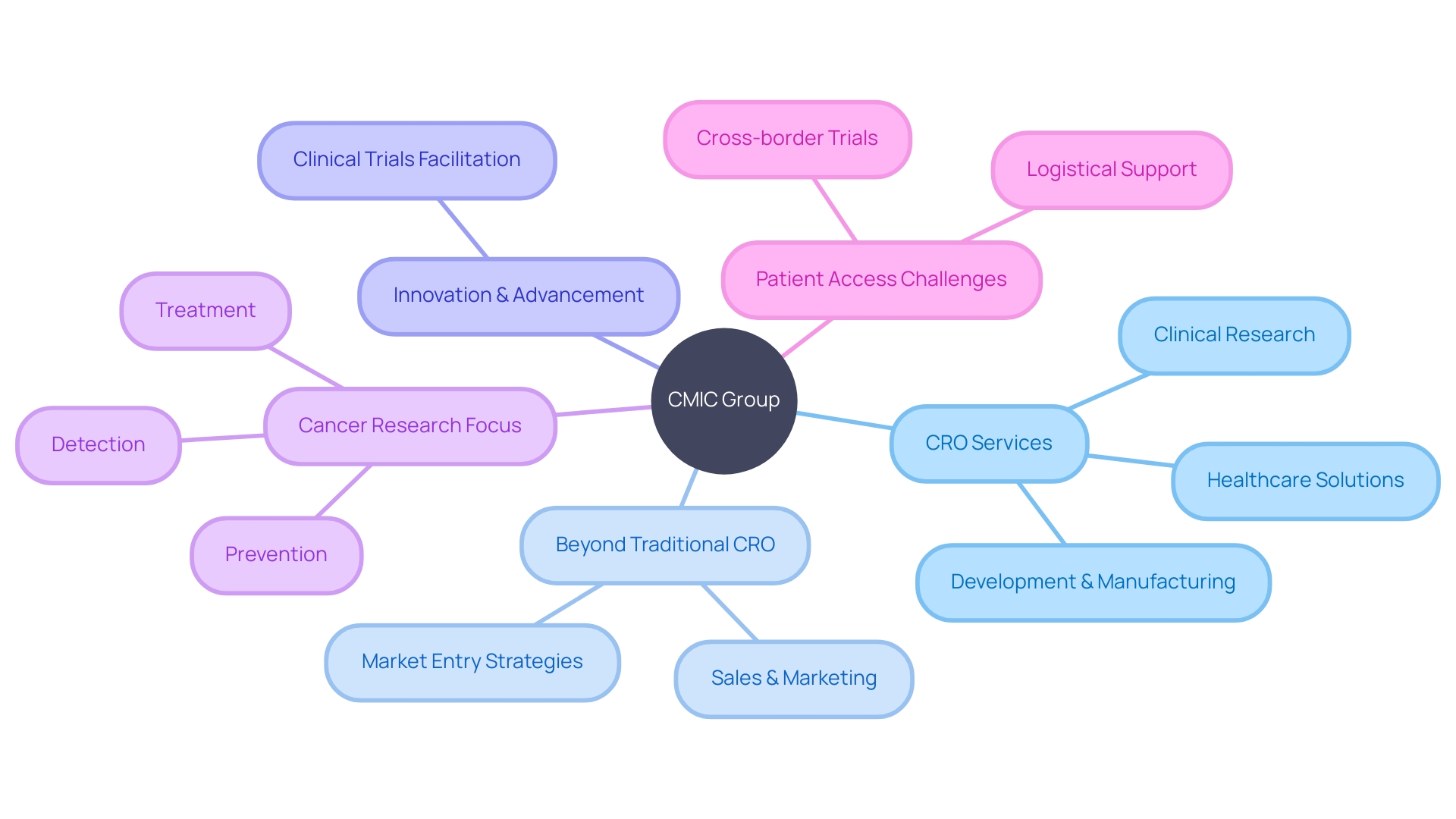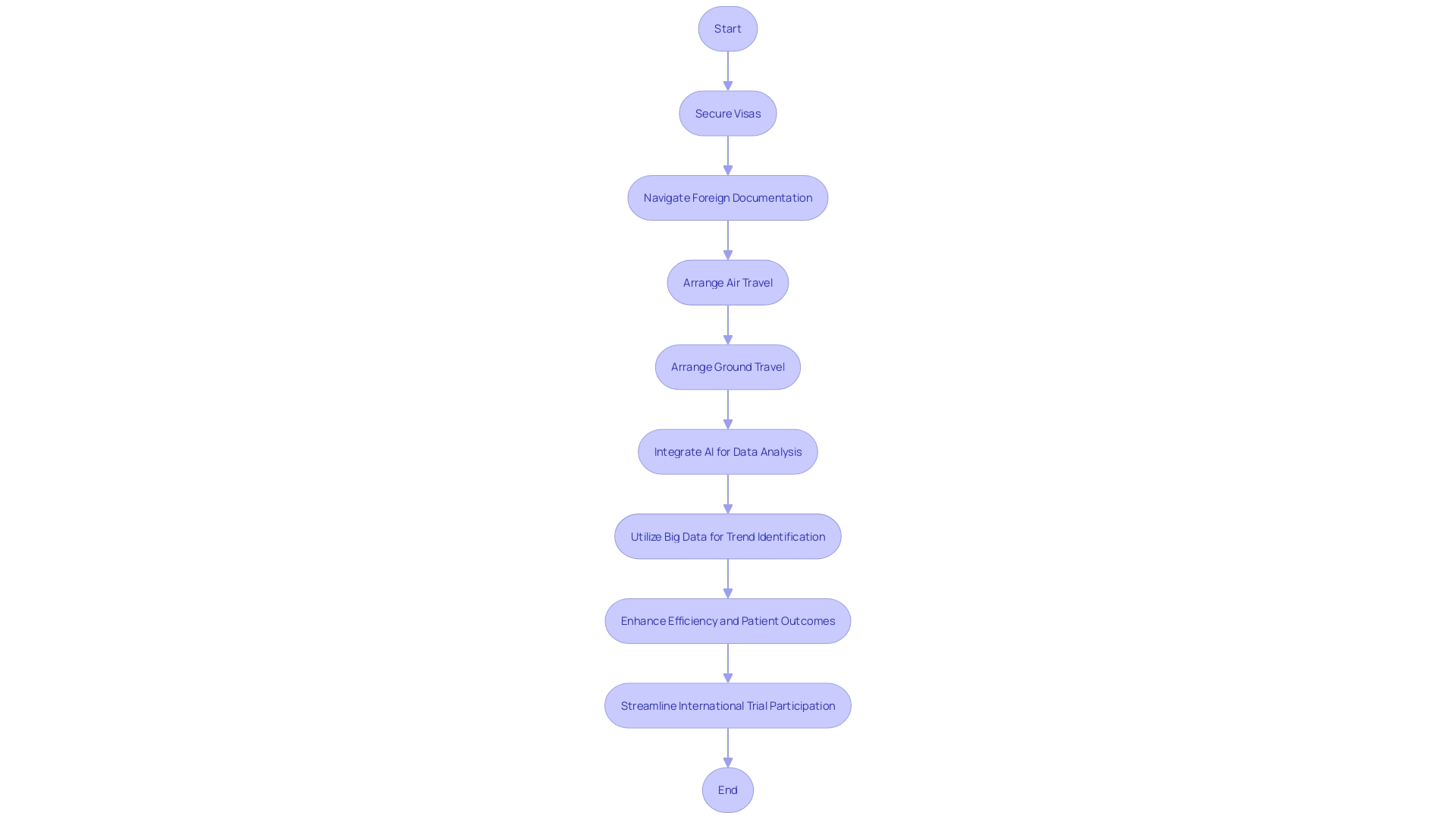Introduction
Clinical trial companies play a pivotal role in the world of clinical research, providing a range of organization services that are essential at every stage of the trial process. These services include developing study designs, addressing ethical considerations, and navigating the complexities of cross-border participation.
In this article, we will explore the importance of organization services in clinical research and how they enhance collaboration, streamline trials, and overcome common challenges. Join us as we delve into the world of clinical research and uncover the impact of these essential services.
The Role of Organization Services in Clinical Research
Clinical trial companies are pivotal in navigating the intricate landscape of clinical research, offering an array of organization services that are vital at each phase of the trial process. These services include crafting robust study designs and developing protocols that address legal, ethical, and social considerations, such as the implications of emerging technologies and their governance.
For instance, case studies frequently begin with scenarios that spotlight ethical dilemmas, prompting researchers to engage with guiding questions that shape the direction of the study while considering international perspectives and legal frameworks. The value of aligning clinical trials with clinical practice has been highlighted in recent discourse, emphasizing the need to bridge the gap between the two.
A JAMA special communication points out the inefficiencies and limitations caused by the separation of clinical trialists and clinicians, advocating for better integration to enhance trial relevance and impact. This is exemplified by the disparity between the vast number of registered RCTs and the limited high-quality trials referenced in treatment guidelines.
Moreover, organization services extend to addressing challenges faced by participants, such as a patient from rural Pennsylvania needing to partake in a trial abroad. This underscores the complexities of cross-border clinical participation, from obtaining visas to navigating foreign documentation. Such scenarios necessitate comprehensive support from clinical trial companies to ensure patients can access life-saving treatments without undue burden. In essence, organization services provided by clinical trial companies are not merely supportive functions but a critical infrastructure that ensures the integrity and success of clinical trials. They play a vital role in not only the execution but also in the strategic planning of studies, as reflected in the insights from industry experts who emphasize the need for meticulous decision-making years in advance to optimize the outcomes of clinical research.
Benefits of Collaboration: How Organization Services Enhance Clinical Research
In the realm of clinical research, the synergy between various sectors is paramount for the progression of medical science. The integration of interdisciplinary collaboration is vividly demonstrated in the coproduction of health research, which aims to incorporate the voices and expertise of diverse stakeholders, including patients, families, and healthcare providers.
This approach not only ensures that the research is attuned to the real-world needs of those it aims to serve but also augments the potential for impactful change in health outcomes. For instance, in the ELSA study, which targets early detection and intervention for Type 1 diabetes, 20,000 UK children are being screened using innovative methods that could revolutionize early disease management and treatment strategies.
Such initiatives exemplify how organization services are pivotal in fostering a collaborative ecosystem, where shared knowledge and resources lead to advancements in healthcare technologies and policies. Moreover, Health Technology Assessment (HTA) has become a cornerstone in guiding treatment decisions and resource allocation, underscoring the economic and clinical evaluation of healthcare interventions. These concerted efforts underscore the essence of collaboration in clinical research, which is to enhance the quality and applicability of research findings, ultimately leading to better patient care and health system improvements.
Streamlining Clinical Trials: The Impact of Organization Services on Efficiency
Clinical trial companies are revolutionizing the efficiency of research by incorporating standardized procedures and innovative technological tools. These advancements are not only enhancing consistency and reducing the likelihood of errors, but they are also dramatically transforming the traditional clinical trial landscape.
For instance, consider the challenges faced by a patient in rural Pennsylvania, diagnosed with an ultra-rare disease and given the chance to join a clinical trial in Turkey. The complexity of cross-border travel, visa procurement, and navigating unfamiliar legal documents in a foreign language can be overwhelming.
Clinical trial companies address these logistical hurdles, simplifying the daunting process for participants. By automating tasks and minimizing manual intervention, these organizations expedite research timelines, making trials more accessible and less burdensome for international participants. The integration of such services is pivotal in enabling patients to partake in potentially lifesaving trials with greater ease, thereby accelerating the development of medical treatments and enhancing patient outcomes globally.
Case Studies: Successful Clinical Research Projects with Organization Services
The transformative effects of Contract Research Organizations (CROs) on the clinical research landscape are epitomized by the pioneering work of CMIC Group in Japan. As the first and largest CRO in Japan, CMIC has expanded its services beyond the traditional CRO scope. It now provides a comprehensive suite of solutions that support the entire pharmaceutical value chain.
This includes contract development and manufacturing, as well as healthcare solutions, sales and marketing, and market entry strategies. With a commitment to innovation, CMIC has facilitated the advancement of numerous clinical trials, offering customized support that meets the unique needs of each client, whether they are pharmaceutical companies, medical device manufacturers, or academic institutions. In the current clinical trial milieu, the portfolio of almost 100 active trials at CMIC spans early to late phase research, tackling both common and rare cancers.
These trials are not only evaluating groundbreaking treatments, but also raising critical questions about the sufficiency of traditional clinical trial designs. With a focus on understanding the mechanisms behind new treatments, CMIC's research endeavors aim to significantly enhance cancer prevention, detection, and treatment. One particularly challenging aspect of clinical trials is their accessibility to patients, especially when trials occur across borders.
For instance, a patient from rural Pennsylvania with an ultra-rare disease faced the daunting prospect of participating in a trial in Turkey. Navigating the complexities of international travel, visa procurement, and language barriers can be overwhelming for patients and their families. This case underscores the need for CROss like CMIC to provide not only scientific and regulatory expertise but also logistical support to ensure that patients can participate in trials that may offer lifesaving treatments.

Overcoming Challenges: How Organization Services Address Common Issues in Clinical Research
The logistics of clinical research are often as complex as the science itself. Consider the plight of a patient from rural Pennsylvania, grappling with an ultra-rare disease for which no FDA-approved treatment exists. Presented with a chance to join a clinical trial in Turkey, the promise of a potentially lifesaving therapy is tempered by a daunting array of logistical hurdles.
The patient faces the intricacies of international travel, from securing visas to navigating unfamiliar bureaucratic processes, all in a language they do not speak. This scenario underscores the vital role of clinical trial companies in not only recruiting suitable participants but also in facilitating the intricate journey they undertake to contribute to advancing medical science. By leveraging targeted strategies and specialized recruitment platforms, these organizations work tirelessly to enroll participants who meet the study's criteria.
Beyond recruitment, the meticulous handling of data stands as a cornerstone of successful clinical research. Clinical trial companies deploy sophisticated systems for the collection, storage, and analysis of data, ensuring the integrity of the research and compliance with regulatory standards. Their expertise and comprehensive resources are instrumental in guiding researchers through the multifaceted landscape of clinical trials, transforming challenges into opportunities for innovation and progress in patient care.
The Future of Clinical Research: Leveraging Organization Services for Maximum Impact
The landscape of clinical research is on the cusp of a transformative era, particularly as it pertains to the challenges faced by patients with rare diseases seeking treatment through international clinical trials. Take, for example, a patient from rural Pennsylvania battling an ultra-rare disease with no treatment approved by the FDA.
An opportunity arises to join a clinical trial in Turkey, offering a glimmer of hope. However, this hope is accompanied by a daunting array of logistical challenges, such as securing visas, navigating foreign documentation, and arranging both air and ground travel.
Such complexities underscore the crucial role of organization services in clinical research, which are increasingly empowered by advances in technology. With the integration of artificial intelligence and big data analytics, these services are set to streamline the research process, simplifying data analysis and trend identification. This technological leverage is not only poised to enhance efficiency and patient outcomes but also to ease the burden of international trial participation, ensuring that patients can focus on treatment rather than travel logistics.

Conclusion
In conclusion, organization services provided by clinical trial companies play a vital role in enhancing collaboration, streamlining trials, and overcoming common challenges in clinical research. These services foster a collaborative ecosystem by integrating interdisciplinary collaboration, incorporating diverse stakeholders' voices and expertise.
By streamlining trials through standardized procedures and innovative technological tools, organization services make trials more accessible and less burdensome for participants. Successful case studies exemplify the transformative effects of these services on clinical research projects, offering customized support throughout the pharmaceutical value chain.
Addressing common challenges such as recruitment and data handling, organization services guide researchers through the multifaceted landscape of clinical trials. Looking towards the future, leveraging technology like artificial intelligence and big data analytics will further enhance efficiency and improve patient outcomes in clinical research. Overall, organization services are critical components that ensure the integrity of clinical trials while advancing medical science and improving patient care globally.




